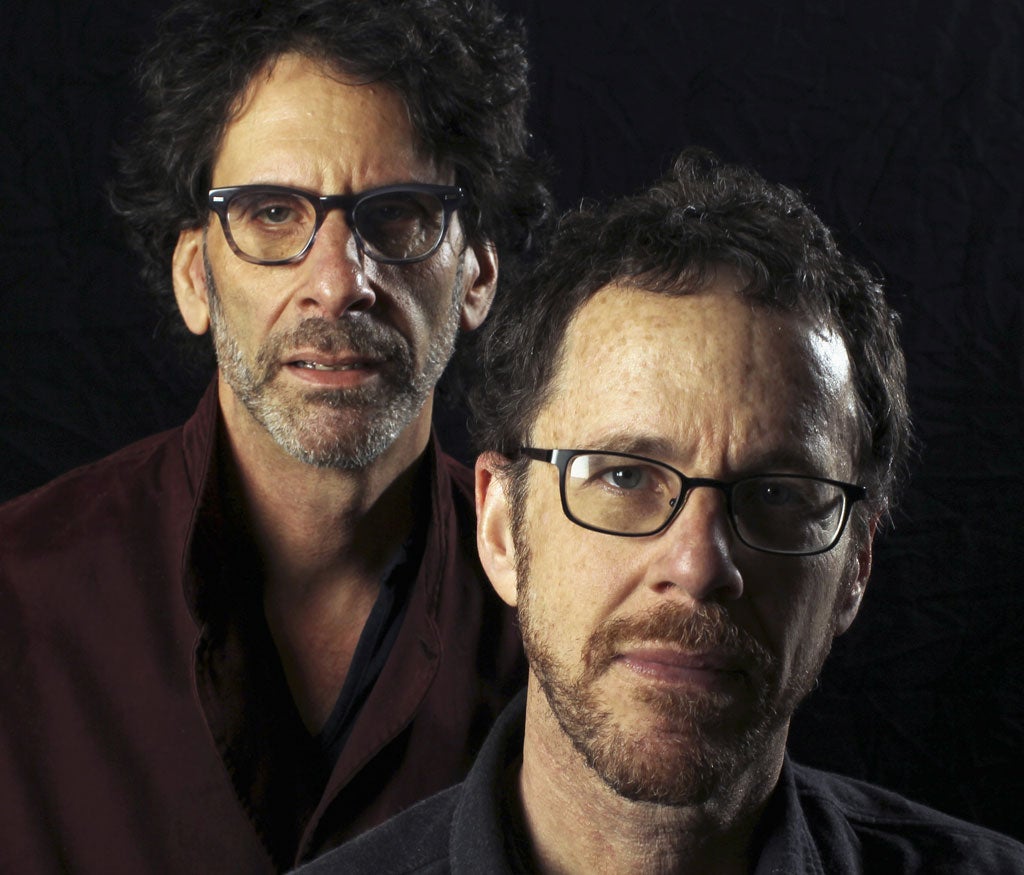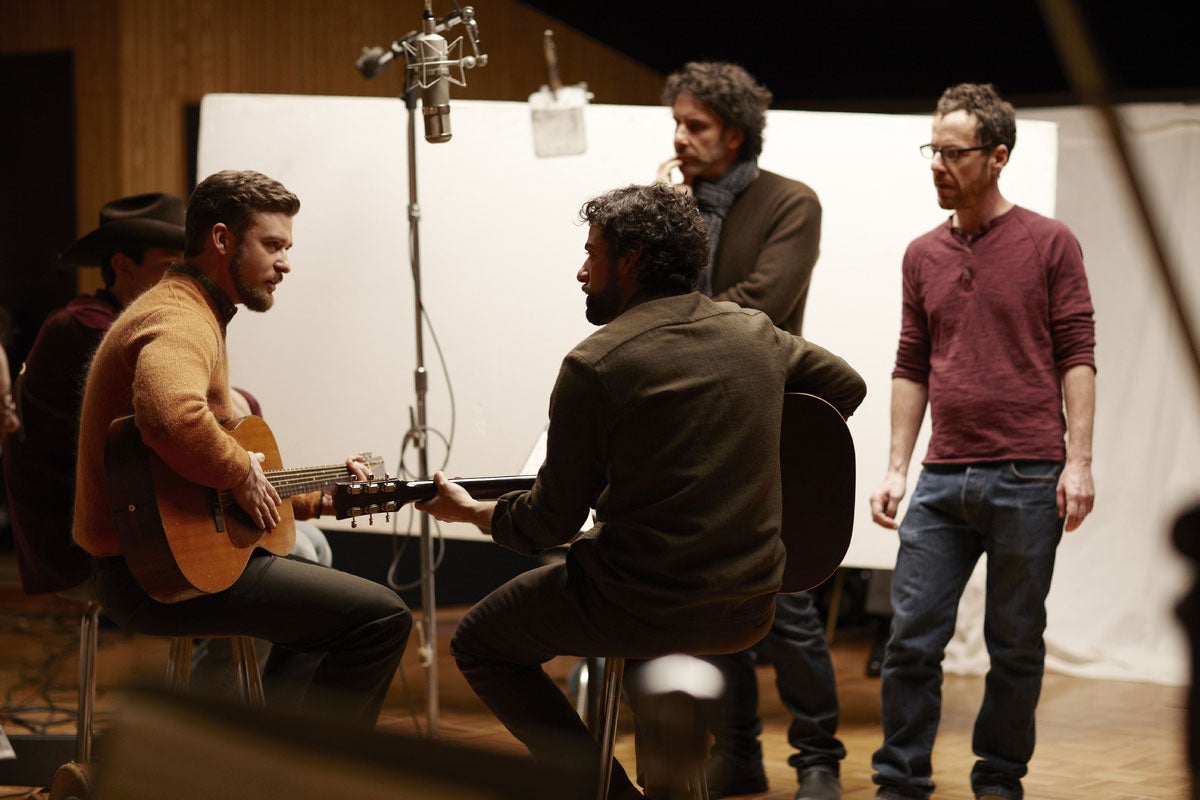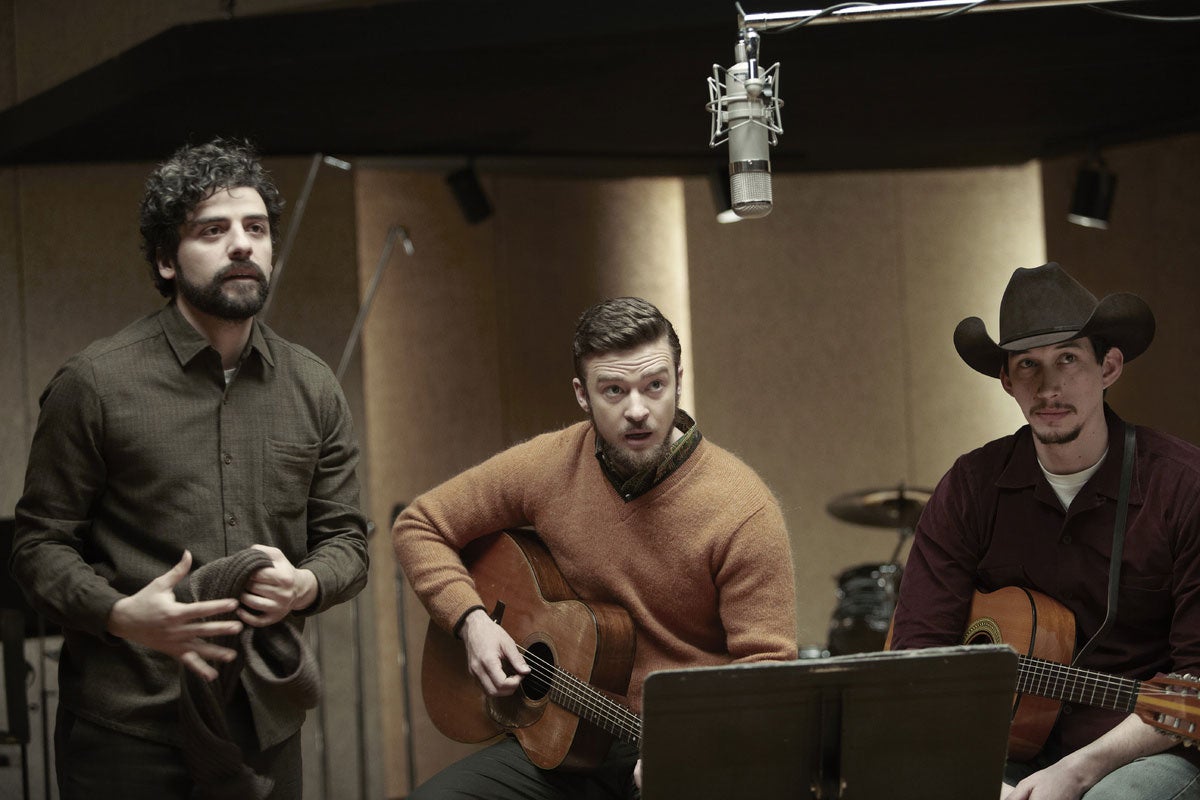There's nowt as queer as folk: Inside the Coen brothers
Joel and Ethan Coen’s new film is an exploration of the musical genre – and a meditation on the power of luck

Your support helps us to tell the story
From reproductive rights to climate change to Big Tech, The Independent is on the ground when the story is developing. Whether it's investigating the financials of Elon Musk's pro-Trump PAC or producing our latest documentary, 'The A Word', which shines a light on the American women fighting for reproductive rights, we know how important it is to parse out the facts from the messaging.
At such a critical moment in US history, we need reporters on the ground. Your donation allows us to keep sending journalists to speak to both sides of the story.
The Independent is trusted by Americans across the entire political spectrum. And unlike many other quality news outlets, we choose not to lock Americans out of our reporting and analysis with paywalls. We believe quality journalism should be available to everyone, paid for by those who can afford it.
Your support makes all the difference.The first time I met Ethan Coen he had the misfortune of hearing me sing – if anyone would be so generous as to describe my croaking as such – “Everybody Wants to Rule the World”. So it’s apt that the first time we sit down to chat about the Coen brothers’ work that it’s for Inside Llewyn Davis, a film about a folk musician.
Their 16th feature film is the latest in a near 30-year run of producing inimitable movies. The Coen brothers have achieved the holy grail of being commercially successful, while also being considered auteurs whose films debut at Cannes. They won the Palme d’Or in 1991 with their third film, Barton Fink, and the Best Picture Oscar for their 2007 adaptation of the Cormac McCarthy novel No Country for Old Men. Yet their most celebrated film was a critical and commercial disappointment when first released. Now though, The Big Lebowski is considered a cult classic, having spawned festivals, a religion and even a 9/11 conspiracy theory. Inside Llewyn Davis picked up the Jury Prize at Cannes in 2013 and last weekend was voted best film of 2013 by the US National Society of Film Critics.
Inside Llewyn Davis is set in the early 1960s and details the travails of a folk musician trying to make it as a solo artist in New York. Oscar Isaac, hitherto best known for his turn as Carey Mulligan’s husband in Drive, plays the titular character. It is the performance of his career.
From the opening scene, in which Llewyn Davis performs quirky song “Hang Me, Oh Hang Me”, he can’t catch a break. It’s typical of the directing brothers that the protagonist is a singer who watches on as Bob Dylan becomes a global superstar. “I think from the movie you can see that we have a fondness and respect for the movie,” said Joel in Cannes. “It was never intended as a parody. Not to say there aren’t funny things about folk music.”

Despite being greeted with acclaim from the moment Blood Simple debuted in 1984, the brothers have had an affinity with the underdog in their films. “Here’s the thing, we took everything bad that might have happened to us and gave it to him. We are luckier than the character in the movie,” says Ethan in a London hotel. “The world has given us more room to manoeuvre then it gives him, so we are lucky in that respect. Although, lucky? This is kind of what the movie is about: to what extent is he just not lucky, not in the right place at the right time and to what extent is he self-defeating?”
It’s an analysis that could be applied to a number of their protagonists. Barton Fink sees an idealistic political-theatre writer become a fish-out-of-water in Hollywood. The Dude in The Big Lebowski is an unemployed slacker who becomes embroiled in a kidnapping through mistaken identity. Blood Simple has a man commit a murder in the belief that he’s helping his girlfriend. The Hudsucker Proxy sees a no-hoper inadvertently turn a company into a success by inventing the hula-hoop.
Their inspirations can come from a wide range of sources. John Goodman’s gun-toting character Walter in The Big Lebowski is partly inspired by John Milius, the screenwriter of the Dirty Harry movies. They’ve acknowledged the influence of pulp novelists Dashiell Hammett and Raymond Chandler on Miller’s Crossing and The Big Lebowski. Inside Llewyn Davis is partially inspired by musician Dave Van Ronk. In fact, Van Ronk’s album Inside Dave Van Ronk features a cat peering through a doorway on its sleeve, and so a cat running through a doorway becomes part of their film’s narrative. Joel even jests, “The film revolves around the cat.”
“We are never on the lookout for characters or things to be in our films,” says Ethan. “It’s that if you are making up a story and a character fits the story in a certain way and you grab this, because you have heard of it, or it strikes you at the time, but you grab what is at hand for whatever reason, because you just happened to read about it, or you meet a real person who nobody has ever heard of, or whatever.”
So in the film when the musician goes to Chicago, it’s not an ode to The Blues Brothers. Laughing, Ethan says, “For you Chicago is The Blues Brothers. For me, I grew up 200 miles from Chicago, so Chicago is just Chicago. In fact here is a literal explanation: the one character that has a real-life model is the character played by F Murray Abraham, who is more or less Albert Grossman, who later became Bob Dylan’s manager and who Van Ronk hitch-hiked to Chicago to audition for.”

Watch Apple TV+ free for 7 days
New subscribers only. £8.99/mo. after free trial. Plan auto-renews until cancelled

Watch Apple TV+ free for 7 days
New subscribers only. £8.99/mo. after free trial. Plan auto-renews until cancelled
The brothers were raised in St Louis Park, Minnesota. Joel was born on November 1954 and Ethan September 1957. Their parents were academics. They grew up in a Jewish family, although they play down the religious influence on their life, Joel often admitting, “it has an impact on us, but in what way, I’m not sure”. A Serious Man and Barton Fink have Jewish leads, but religion is far from their thoughts. They discovered movies watching a black-and-white television and by signing up to a film club at the University of Minnesota. In his teenage years Joel bought a camera and their film-making odyssey began.
What’s remarkable is how they have come to be seen as a single entity. They don’t even have separate pages on Wikipedia, which seems slightly harsh on Ethan, who has a career away from films as a playwright and author. He says that there are efforts to bring some of his plays to London. Their early films were credited as being directed by Joel and produced by Ethan. This was initially because there used to be a quirk of the Directors Guild of America rulebook frowning on joint director credits. The rules changed but they carried on crediting themselves separately as director and producer until The Ladykillers. “At a certain point I had to share my producer credit because we started doing things that we didn’t originate. We had to share producer credit and it made Joel uptight that he got one credit and I had to share my credit. So we started sharing both credits.”
But way before The Ladykillers it had been recognised they were co-creators. From the get-go they did interviews together as co-directors and writers. Even today, some still believe the fifty-something directors live, work and play together. Many people are still not sure which of the brothers is married to actress Frances McDormand. It’s Joel. Ethan has two teenage children with The Big Lebowski editor Tricia Cooke.

“I know, it’s funny,” says Ethan. “It’s understandable that people think that. They don’t know us. We are the movies and so we are interchangeable, and that’s okay. As you know, we do go home at night to different families.”
I can sympathise with the public perception because that’s how I thought of the Coen brothers before I started to get to know Ethan through a mutual friend in the summer of 2009. Before that it was easy to buy into the mythology of them as a single entity. My expectation of Ethan had been clouded by an anecdote that Josh Brolin had told me, him having just played Llewelyn Moss in No Country for Old Men: “They’re a quiet bunch. I had Ethan go out for dinner with me and he brought a book, which he started reading during dinner. I tried to remind him that I was at the dinner table too, and he said, ‘I’m sorry’.” All I could think was how awkward and rude.
Not wishing to sound like Pauline Kael (who befriended and wrote about many directors from the New Hollywood scene), my fears were allayed. He’s a man typical of the Midwest characters depicted in his films; despite living in New York City he still suits the stereotype of Midwesterners, someone who goes about his business with little fanfare or drama. And he loves seeing people’s foibles, not in a mean or nasty way, but just delighting in the vagaries of human nature.
His older taller brother seems more mysterious. But that’s probably because he’s the brother I have only met on a couple of occasions, mostly informally. In London, we exchange a greeting at the party for the film, but it’s with Ethan that it’s easier to sit and have a long chat about their work. So contrary to how they present themselves, which they admit is by design, they seem very separate people in my mind.
Joel’s big break in the film industry was working as an assistant editor on Sam Raimi’s The Evil Dead. There have been several collaborations between the brothers and Raimi since. Joel and Raimi even made a cameo appearance together in the film Spies Like Us. The Evil Dead director co-scripted The Hudsucker Proxy whilst the Coens helped write Crimewave.
The brothers have often written scripts for other film-makers. In 2012, the Colin Firth sleuth Gambit was penned by the brothers, as is Unbroken, the new directorial effort from Angelina Jolie about Louis Zamperini, an Olympic runner who was taken prisoner by Japanese forces during The Second World War. “We have always taken writing gigs. It’s kind of fun, interesting and... “almost whispering, Ethan adds, “lucrative. We have always done it and just in the way of Hollywood that 80 or 90 per cent of what is written never gets made, it’s just in the last few years a couple of them have got through.”
It was through Brad Pitt, who appeared in Burn After Reading that Jolie came to them. “Yeah we know her a little. Why did she solicit us? Yeah, because she knows us. There is something good about being able to blithely write whatever you want without having to worry about having to think, even in the back of your mind about the reality of production. It’s really true, especially that movie, which is really a motherfucker, a difficult production thing, there is aerial combat stuff, dogfight stuff, and there is stuff on a lifeboat on an open sea. But you know, it’s from a book, it’s not fiction stuff, so it’s not like Angie can blame us for that.”
The brothers don’t follow the rules you’d find in a screenwriting book when they approach a film: “Generally when we are writing a movie, we don’t know where we are going in advance of writing the script. We don’t do an outline and then start writing it. We just start writing it scene-by-scene and not know where we are going until we get there.”

The exception to the rule is Inside Llewyn Davis. “We knew early on it would be cyclical. But why we knew that, why it felt good, and why it feels more resolved than the other ones, I don’t know. Actually, I do, it’s kind of what the story is about, it’s about a character in a hamster wheel so it’s reflected in how we shape the story.”
The Coen brothers have been around long enough that their films are now being remade. Blood Simple was given a Chinese makeover as A Woman, a Gun and a Noodle Shop. “The director Zhang Yimou is great. So we thought alright, it won’t be bad, it will at least be interesting.”
There is also a TV makeover of Fargo being filmed. “We are not terribly involved. Indeed to say that is an understatement. They are actually doing what is probably a really smart choice: none of the characters from the movie are in it. It’s kind of a police drama set in that world.”
Why they won’t get involved seems to stem from the same rationale as why there won’t be a sequel to The Big Lebowski, “It feels like a veiled criticism when people want sequels. Didn’t we do a good job the first time round?”
‘Inside Llewyn Davis’ is released on 24 January
Best of the brothers
1. No Country for Old Men 2007
The best big-screen adaptation of a Cormac McCarthy novel is a violent crime thriller set in the aftermath of a drug-deal gone wrong. Javier Bardem’s hit-man hairdo will live long in the memory, the only airiness in an otherwise sinister tale.
2. The Big Lebowski 1998
The Dude, a brilliantly laconic Jeff Bridges, is the ultimate anti-hero who walks around in a dressing gown and lives to drink White Russians and go bowling with his eccentric friends. His life of chill is ruined when he’s entangled in a kidnapping.
3. Fargo 1996
Frances McDormand won an Oscar for her brilliant portrayal of a pregnant North Dakota police officer Marge Gunderson called to a roadside murder scene. Yeah, she’s unlike any movie cop, but scarily like every real-life police officer.
4. Barton Fink 1991
The Palme d’Or winner, set in 1941, is a psychological examination of an acclaimed New York theatre writer who gets writer’s block when Hollywood comes calling. A searing insight into the artistic and film-making process,
5. Raising Arizona 1987
The brothers’ second outing was the film that introduced the world to their zany brand of goofy comedy and penchant for kidnapping. Nic Cage and Holly Hunter play a childless couple who don’t think the parents of quintuplets will miss one of their babies.
6. Blood Simple 1984
A noir thriller in which a bar owner hires a private detective to kill a wife he suspects of adultery. The plan backfires sending the Austin protagonists into a Hitchcock-ian moral maze.
Join our commenting forum
Join thought-provoking conversations, follow other Independent readers and see their replies
Comments